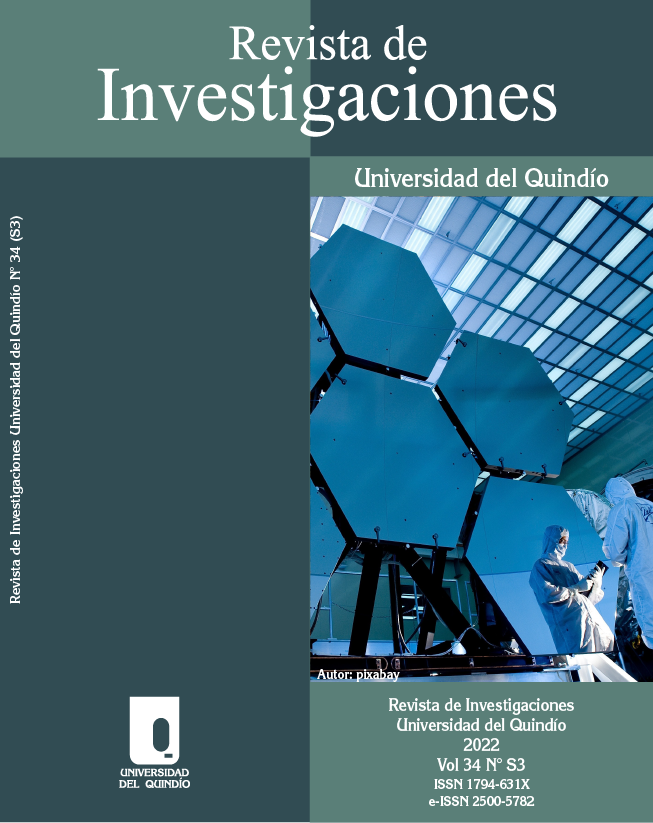Determinantes de la conducta adaptativa de un estudiante de maestría en educación psicológica y pedagógica como sujeto de reflexión científica
DOI:
https://doi.org/10.33975/riuq.vol34nS3.994Palabras clave:
Comportamiento adaptativo, Personalidad, Estudiante de pregrado, Actividad educativa, Futuro psicólogoResumen
El artículo revela los puntos de vista actuales de la comunidad profesional sobre el comportamiento adaptativo, las ideas de transición al desarrollo de una estructura de personalidad relativamente estable de un estudiante de maestría en educación psicológica y pedagógica. Los datos se obtuvieron utilizando los métodos de diagnóstico psicológico: un cuestionario personal multinivel (MLO) "Adaptabilidad", el cuestionario "SOP-2" (Tendencia a la conducta desviada), el método "Despersonalización por sistemas profesionales", el análisis de actividades educativas con enfoque en el método de casos, valoraciones sociales, conversaciones individuales. Teniendo en cuenta el estado actual, los problemas y las evaluaciones de diagnóstico, se puede llegar a la conclusión lógica de que los determinantes de la formación y desarrollo del comportamiento adaptativo son las leyes dialécticas del desarrollo de la materia, y la totalidad de indicadores del potencial adaptativo personal individual, el la tendencia a desviarse de la conducta, la satisfacción con la vida y la eficacia educativa determinarán el nivel de la conducta estudiada.
Descargas
Citas
Flesia, L., Monaro, M., Mazza, C., Fietta, V., Colicino, E., Segatto, B., & Roma, P. (2020). Predicting perceived stress related to the Covid-19 outbreak through stable psychological traits and machine learning models. Journal of clinical medicine, 9(10), 3350.
Geerts, E., & Bouhuys, N. (1998). Multi-level prediction of short-term outcome of depression: Non-verbal interpersonal processes, cognitions and personality traits. Psychiatry Research, 79(1), 59-72.
Guilmette, M., Mulvihill, K., Villemaire-Krajden, R., & Barker, E. T. (2019). Past and present participation in extracurricular activities is associated with adaptive self-regulation of goals, academic success, and emotional wellbeing among university students. Learning and Individual Differences, 73, 8-15.
Gurven, M. D. (2018). Broadening horizons: Sample diversity and socioecological theory are essential to the future of psychological science. Proceedings of the National Academy of Sciences, 115(45), 11420-11427.
Gustems-Carnicer, J., Calderón, C., & Calderón-Garrido, D. (2019). Stress, coping strategies and academic achievement in teacher education students. European Journal of Teacher Education, 42(3), 375-390.
Hong, J. C., Lee, Y. F., & Ye, J. H. (2021). Procrastination predicts online self-regulated learning and online learning ineffectiveness during the coronavirus lockdown. Personality and individual differences, 174, 110673.
Khusainova, S. V., Matveyeva, L. V., Ermilova, L. P., Yakushevskaya, K. N., Kolomiychenko, L. V., & Mashkin, N. A. (2018). Adaptive model of psychological and pedagogical accompany of student professional training. Revista Espacios, 39(05), 45-66.
Martínez, I. M., Youssef-Morgan, C. M., Chambel, M. J., & Marques-Pinto, A. (2019). Antecedents of academic performance of university students: Academic engagement and psychological capital resources. Educational Psychology, 39(8), 1047-1067.
Pérez-López, M. C., González-López, M. J., & Rodríguez-Ariza, L. (2019). Applying the social cognitive model of career self-management to the entrepreneurial career decision: The role of exploratory and coping adaptive behaviours. Journal of vocational behavior, 112, 255-269.
Popovych, I., & Blynova, O. (2019). Research on the correlation between psychological content parameters of social expectations and the indexes of study progress of future physical education teachers. Journal of Physical Education and Sport, 19, 847-853.
Rahmatullah, A. S., Mulyasa, E., Syahrani, S., Pongpalilu, F., & Putri, R. E. (2022). Digital era 4.0: The contribution to education and student psychology. Linguistics and Culture Review, 6, 89-107.
Rutchick, A. M., Slepian, M. L., Reyes, M. O., Pleskus, L. N., & Hershfield, H. E. (2018). Future self-continuity is associated with improved health and increases exercise behavior. Journal of Experimental Psychology: Applied, 24(1), 72.
Su, R. (2020). The three faces of interests: An integrative review of interest research in vocational, organizational, and educational psychology. Journal of Vocational Behavior, 116, 103240.
Trigueros, R., Aguilar-Parra, J. M., Cangas, A. J., Bermejo, R., Ferrandiz, C., & López-Liria, R. (2019). Influence of emotional intelligence, motivation and resilience on academic performance and the adoption of healthy lifestyle habits among adolescents. International journal of environmental research and public health, 16(16), 2810.
Vansteenkiste, M., Ryan, R. M., & Soenens, B. (2020). Basic psychological need theory: Advancements, critical themes, and future directions. Motivation and emotion, 44(1), 1-31.
Vizoso, C., Arias-Gundín, O., & Rodríguez, C. (2019). Exploring coping and optimism as predictors of academic burnout and performance among university students. Educational Psychology, 39(6), 768-783.
Wang, Y., Derakhshan, A., & Zhang, L. J. (2021). Researching and practicing positive psychology in second/foreign language learning and teaching: the past, current status and future directions. Frontiers in Psychology, 12.
Descargas
Publicado
Cómo citar
Número
Sección
Licencia
Derechos de autor 2022 Revista de Investigaciones Universidad del Quindío

Esta obra está bajo una licencia internacional Creative Commons Atribución-NoComercial-SinDerivadas 4.0.


